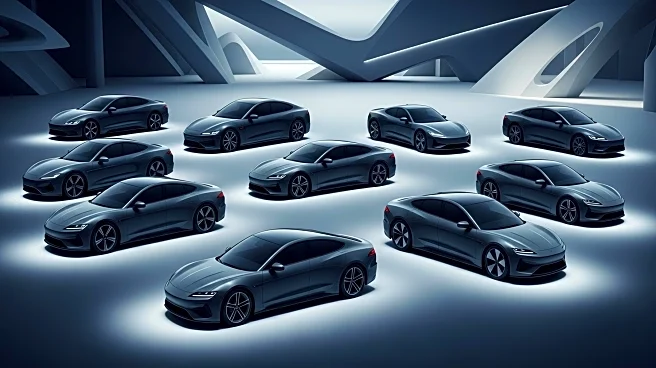What is the story about?
What's Happening?
The U.S. electric vehicle (EV) market is witnessing a significant expansion with a wide array of models available across various price points. Notable brands such as Tesla, Audi, BMW, and Ford are offering vehicles ranging from affordable options like the Chevy Bolt at $28,595 to luxury models like the Audi e-tron GT priced at $125,500. This diverse lineup includes sedans, SUVs, and trucks, catering to different consumer preferences and needs. The list of available EVs is continually updated, reflecting the dynamic nature of the market and the increasing consumer interest in electric mobility.
Why It's Important?
The expansion of the electric vehicle market is crucial for several reasons. It represents a shift towards sustainable transportation, reducing reliance on fossil fuels and decreasing carbon emissions. This transition is supported by technological advancements and government incentives aimed at promoting clean energy. The variety in pricing and models makes EVs accessible to a broader audience, potentially accelerating the adoption rate. As more consumers opt for electric vehicles, traditional automakers are compelled to innovate and compete, fostering a competitive market that benefits consumers through improved technology and reduced costs.
What's Next?
The continued growth of the electric vehicle market is likely to spur further innovation and investment in battery technology and charging infrastructure. Automakers may focus on enhancing range and performance to meet consumer demands. Additionally, government policies and incentives could evolve to further support the transition to electric mobility. As the market matures, consumers can expect more competitive pricing and a wider selection of models, potentially leading to increased market penetration and a significant reduction in transportation-related emissions.
Beyond the Headlines
The rise of electric vehicles also has implications for the automotive industry workforce, as skills related to traditional combustion engines may need to be adapted to electric vehicle technology. Furthermore, the shift towards electric mobility could influence urban planning and infrastructure development, with increased demand for charging stations and renewable energy sources. This transition may also impact oil markets and related industries, as the demand for gasoline decreases.

















